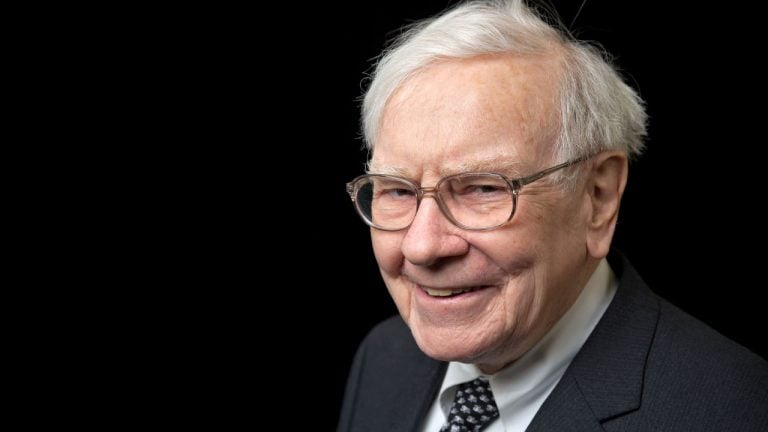 Finance mogul Warren Buffett, one of the most successful investors in history, discussed bitcoin during an interview on CNBC’s Squawk Box on April 12. As he has done in previous interviews, the business magnate likened bitcoin to a gambling scheme and chain letters he received as a child. Buffett Shares His Two Cents on Bitcoin, […]
Finance mogul Warren Buffett, one of the most successful investors in history, discussed bitcoin during an interview on CNBC’s Squawk Box on April 12. As he has done in previous interviews, the business magnate likened bitcoin to a gambling scheme and chain letters he received as a child. Buffett Shares His Two Cents on Bitcoin, […]
The Galaxy Digital CEO predicts tough times ahead for the U.S. economy, but continues to be bullish on crypto.
The United States is headed for a credit crunch and now is the right time to buy gold, silver and Bitcoin (BTC), says Galaxy Digital founder and CEO Michael Novogratz.
“We are going to have a credit crunch in the U.S. and globally,” Novogratz explained in an interview on CNBC. "You want to be long gold and silver [...] and you want to be long Bitcoin,” he said.
Speaking on CNBC’s Squawk Box on March 15, Novogratz noted that banks typically rebuild capital by lending less, meaning that a credit crunch is imminent, noting that indicators like the commodities market are already pointing to a recession.
The U.S. banking industry fell into turmoil this month, with Silvergate Bank, Signature Bank, and Silicon Valley Bank (SVB) all collapsing in the same week. Moody's downgraded the U.S. banking system outlook to "negative."
Related: Blame traditional finance for the collapse of Silicon Valley Bank
In the interview, Novogratz suggested a reversal in interest rate policy was on the cards, saying that while the Federal Reserve would “like to do a dovish hike, just for credibility’s sale,” doing so would be a “huge policy error.”
Alongside his prediction of tough times for the U.S. economy, Novogratz expressed a bullish sentiment for crypto, saying:
“If there was ever a time to be in bitcoin and crypto, this is why it was created, in that governments print too much money whenever the pain gets too great, and we’re seeing that.”
The price of Bitcoin dipped after the collapse of Silicon Valley Bank last week but managed to reach new 2023 highs of $26,514.72 on March 14, according to CoinMarketCap.
Looks like Bitcoin is moving on from its risk asset days. As more and more people begin to understand its fundamental value case, the market is slowly turning to Bitcoin as a digital form of gold.
— Handre van Heerden (@Handrev) March 14, 2023
 On Feb. 9, 2023, the cryptocurrency community learned of the U.S. Securities and Exchange Commission’s (SEC) crackdown on staking services. The SEC fined Kraken, a cryptocurrency exchange, $30 million for offering an “unregistered offering” related to its U.S. staking service. Digital currency advocates are now debating what constitutes a yield product versus a noncustodial solution […]
On Feb. 9, 2023, the cryptocurrency community learned of the U.S. Securities and Exchange Commission’s (SEC) crackdown on staking services. The SEC fined Kraken, a cryptocurrency exchange, $30 million for offering an “unregistered offering” related to its U.S. staking service. Digital currency advocates are now debating what constitutes a yield product versus a noncustodial solution […]
Binance CEO Changpeng “CZ” Zhao is fighting fear, uncertainty and doubt, saying assets held on the world’s largest exchange are one-to-one backed. In a new interview with CNBC Squawk Box host Aaron Sorkin, Zhao says they would not have a liquidity crunch covering any amount of customers’ withdrawals. “People can withdraw 100% of the assets […]
The post Binance CEO Says the World’s Largest Crypto Exchange by Volume Holds Customer Assets One-to-One appeared first on The Daily Hodl.
 Galaxy Digital’s CEO Mike Novogratz talked to Andrew Ross Sorkin on CNBC’s Squawk Box and gave his reaction to Sam Bankman-Fried’s (SBF) recent New York Times (NYT) Dealbook Summit interview. Novogratz said that SBF was “delusional” and insisted that the former FTX CEO needs to be prosecuted and further said, “he will spend time in […]
Galaxy Digital’s CEO Mike Novogratz talked to Andrew Ross Sorkin on CNBC’s Squawk Box and gave his reaction to Sam Bankman-Fried’s (SBF) recent New York Times (NYT) Dealbook Summit interview. Novogratz said that SBF was “delusional” and insisted that the former FTX CEO needs to be prosecuted and further said, “he will spend time in […]
A crypto investing veteran sees no break in the clouds ahead for most asset classes as the markets limp into summer. In a new interview with CNBC’s Squawk Box, CoinShares chief strategy officer (CSO) Meltem Demirors says her firm remains cautious about further Bitcoin (BTC) investment due to a lack of data on how BTC might […]
The post Here’s When Bitcoin Will See New All-Time Highs, According to CoinShares CEO Meltem Demirors appeared first on The Daily Hodl.

U.S. Secretary of the Treasury, Janet Yellen speaks to CNBC's Squawk Box shares her views on the state of digital assets amid calls for imposed regulations.
Janet Yellen, the 78th United States Secretary of the Treasury, spoke Friday morning on CNBC’s flagship business and politics show Squawk Box, on an array of topics from the growth of the renewable energy sector amid Russia’s economic isolation, the rising levels of inflation and Federal Reserve responsibility, as well as her current perspective on digital assets.
Recognizing the multitude of technological and societal advancements within the cryptocurrency space over the past few years, Yellen offered a friendlier, more receptive tone than on previous occasions, stating that crypto is “now playing a significant role, not really so much in transactions, but in investment decisions of lots of Americans.”
"There are benefits from crypto, and we recognise that innovations in the payments system can be a healthy thing."
I see a lot of strength in the American economy. We have an immensely strong job market, historically low unemployment numbers, and consumer spending continues to hold strong. I joined @SquawkCNBC this morning to discuss. pic.twitter.com/NKM1H8fDQC
— Secretary Janet Yellen (@SecYellen) March 25, 2022
Alongside this, Yellen was keen to raise some concerns around the market’s financial stability — an assessment often levelled at the industries highly-volatile assets from experts and officials operating within the Wall Street jurisdiction — in addition to consumer investment protection, and its usage for illicit transactions.
Yellen’s historical sentiment of digital assets can be quaintly summarised by recalling her remarks at the February 2021 U.S. Financial Sector Innovation Policy Roundtable: “I see the promise of these new technologies, but I also see the reality”, continuing to list problems with money laundering, online drug traffickers and finance terrorism in the industry.
Related: Janet Yellen let slip details of Biden‘s executive order on crypto
Earlier this month, President Joe Biden issued an executive order on crypto — his 82nd under tenure — and one which advocated for a unification of all regulatory bodies in publishing consumer-centric financial frameworks.
Industry leaders largely praised the order and spoke with hope on the opportunities it could present moving forward, with Yellen herself stating that it could “result in substantial benefits for the nation, consumers, and businesses.”
 On June 24, the CEO of Far Peak Acquisition Corp. and former New York Stock Exchange (NYSE) president, Thomas Farley discussed the future of bitcoin and gold on the CNBC broadcast Squawk Box. Farley is optimistic about the leading crypto asset but he doesn’t believe it will surpass gold’s $10 trillion market capitalization unless it’s […]
On June 24, the CEO of Far Peak Acquisition Corp. and former New York Stock Exchange (NYSE) president, Thomas Farley discussed the future of bitcoin and gold on the CNBC broadcast Squawk Box. Farley is optimistic about the leading crypto asset but he doesn’t believe it will surpass gold’s $10 trillion market capitalization unless it’s […]
Jeff Currie, the global head of commodities research at Goldman Sachs, described Bitcoin as a “risk-on” asset that is similar to copper as a hedge against inflation.
Jeff Currie, the global head of commodities research at Goldman Sachs, has dismissed comparisons between Bitcoin and gold as an inflation hedge, and described BTC as more akin to a “risk-on” asset like copper.
Speaking on CNBC’s Squawk Box Europe on June 1, Currie noted that copper and Bitcoin both work as “risk-on assets” for hedging due to their volatility while describing gold as a more stable “risk-off” hedge”:
"Digital currencies are not substitutes for gold. If anything, they would be a substitute for copper, they are pro-risk, risk-on assets. They are a substitute for risk on inflation hedges not risk-off inflation hedges"
“You look at the correlation between Bitcoin and copper, or a measure of risk appetite and Bitcoin, and we’ve got 10 years of trading history on Bitcoin — it is definitely a risk-on asset,” he added.
Currie’s comments come after the recent crypto downturn, which has seen Bitcoin’s price fall 36.8% in a few weeks according to CoinGecko, declining from around $57,000 on May 12 to roughly $36,000 today.
Ethereum has also taken a similar hit, dipping 39.58%, moving from around $4,300 on May 12 to around $2,598.
Copper has seen a lot of volatility in 2021. On Jan. 3 it was priced at $3.56 and rose to 4.30 by Feb. 24. The price then fluctuated between $3.50 to $4.00 from March until it broke out to $4.80 on May 10. The price now sits at $4.65.
Currie noted that “there is good inflation and there is bad inflation,” which different assets hedge against, and explained that, “Good inflation is when demand pulls it" and he said Bitcoin, copper and oil are hedges against this type of inflation. However:
“Gold hedges bad inflation, where supply is being curtailed, which is … focused on the shortages on chips, commodities, and other types of input raw materials. And you would want to use gold as that hedge.”
The Goldman Sachs boss previously argued in an April note that Bitcoin cannot yet be seen as digital gold, as its “vulnerable to losing store-of-value demand to another, better-designed cryptocurrency," adding that: "We think it is too early for Bitcoin to compete with gold for safe-haven demand and the two can coexist."
According to TradingView, since April 1 gold has been on an upward trend, increasing from $1686 up to $1900 as of today.
In a note from Monday, Currie stated that he believes commodities with real-world use are the best hedge against inflation because they ultimately rely on demand, and not growth rates:
“Commodities are spot assets that do not depend on forward growth rates but on the level of demand relative to the level of supply today.”
“As a result, they hedge short-term unanticipated inflation, created when the level of aggregate demand is exceeding supply in the late stages of the business cycle,” the note added.